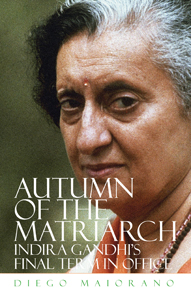Autumn of the Matriarch
Indira Gandhi’s Final Term in Office
A revealing political history of Mrs Gandhi’s final term that sheds light on the successes and failures of her last four years in office.
Description
Indira Gandhi’s last years in office as India’s prime minister ran from January 1980 to her assassination in October 1984 but until now no book has been devoted to her final term. Among the principal themes discussed in this innovative volume are how Indian politics and society changed in the 1970s, including the state of Emergency (1975-77) Congress’s response to insurgency in Punjab, Assam and Kashmir, the rise of new forms of political mobilisation in the early 1980s and the prime minister’s relationship with the key institutions of state. Maiorano also reveals how Mrs Gandhi’s policies in the 1980s impacted on the big industrialists, the middle class, the rich peasantry and the poor, thereby crucially re-orienting India’s economic strategy. Autumn of the Matriarch is the first major study of Mrs Gandhi’s last years in power, an important juncture in India’s recent history, as it was then that emerged trends that influenced the country for the next three decades.
Table of contents
Introduction:
A strange decade
Institutions and political agency
Structure of the book
1. Indian Politics and Society in the 1970s
Introduction
The Socio-economic Context
Demands for Political Representation
The Deinstitutionalisation of the Congress Party
The Emergency 1975-77
2. The Party that didn’t work: The Congress (I) in the Early 1980s
Introduction
The Rise of the Youth Congress
The General Elections of January 1980: The Context
Coalition-building and Electoral Alliances
The Electoral Campaign
The Election Outcomes
January-June 1980: The Defectors Market
The Congress (I) in the states
Reform of the Congress (I): Rajiv Gandhi’s attempt
Declining Governability: The Deterioration of Law and Order
Conclusion
3. Political Mobilisation in the Early 1980
Introduction
The Indian Economy 1980-84: An Overview
The Business Community
The Middle Class
Rich Farmers
The Poor
Mrs Gandhi’s Political Strategy
The Weaker Sections
The Middle Class’s Need for Political Representation
Mrs Gandhi’s Social Base in the 1980s
The Rise of Political Hinduism
The Rise of the Regional Alternatives
Conclusion
4. Institutions: Politicisation, Erosion, and Informalisation
Introduction
Politicisation of Institutions: the Bureaucracy
Politicisation of Institutions: the Judiciary, the Parliament, and the Presidency
Erosion of Institutions: The Rule of Law and the Constitution
Informalisation of Institutions: The Federal Setting
Conclusion
Conclusion
Bibliographical References
Official Documents and Reports
Party and Civil Society Organisation Documents
Private Papers held at Nehru Memorial Museum and Library (NMML)
Interviews cited in the text
Newspapers and Periodicals
Books and Articles
Reviews
‘[Maiorano] provides an important insight into the later implications for India of Gandhi’s time in power.’ — The World Today
‘Maiorano has … produced an analytical study that offers some original insights into an important if dark period in Indian political life. … [P]erhaps the most original finding of his book is its argument that Mrs Gandhi used her final term to inaugurate a new alliance between the state, the corporate sector and the middle class. … [Maiorano’s] enthusiasm for his subject is infectious and his research very impressive. He has painstakingly read the Indian daily press for the period on which he focuses and has also interviewed a wide range of Indian politicians, journalists and political scientists.’ — Standpoint
‘In an elegantly written and compact study, [Maiorano] sketches the shift Gandhi brought about from a Congress with a strong base in India’s rural areas to one that relied critically on a threeway alliance combining the state, the urban middle class and India’s corporate sector … This account of the weakness and vulnerability of India’s institutions makes sobering reading.’ — Survival
‘This fine book is the first comprehensive analysis of Indira Gandhi’s last spell in power and fills a major gap in our understanding. It examines her drive for personal rule and its corrosive impact on democratic institutions, and assesses her manipulation of dangerous communal forces which ultimately led to her own demise. And yet it is also an admirably balanced account of crucial economic and other policy issues, and much else besides.’ — James Manor, Emeka Ayaoku Professor Emeritus of Commonwealth Studies, School of Advanced Study, University of London
‘Maiorano’s study of Indira Gandhi’s final term in office is illuminating. His carefully crafted analysis, interweaving national and state level dynamics, contributes to our understanding of Indian politics during this period, and of her legacies to contemporary Indian politics, economy and society.’ — Katharine Adeney, Director of the Institute of Asia and Pacific Studies, University of Nottingham
‘In this penetrating study of Indian politics in the 1980s Diego Maiorano shows how, in her last term as prime minister, Indira Gandhi contributed to making the hard task of governing India even harder, making choices that helped bring to the fore the Hindu nationalism, regional and caste oriented politics and venal political culture of today’s India. The revealing picture he draws of India then is invaluable in understanding the country now.’ — James Chiryankandath, Senior Research Fellow, Institute of Commonwealth Studies, London; editor of Parties and Political Change in South Asia
‘A meticulously researched and lucidly written study that offers a much needed reappraisal of a central figure and a pivotal decade in Indian politics. Maiorano is a fine scholar, measured and perceptive in his assessments, challenging simplistic views of Indira Gandhi and the 1980s.’ — Rochana Bajpai, Associate Professor, Department of Politics and International Studies, SOAS University of London
Author(s)
Diego Maiorano is a research fellow at the Institute of Commonwealth Studies, University of London. He has written several articles on Indian politics and society, most recently for Modern Asian Studies, World Development, and Economic and Political Weekly.
